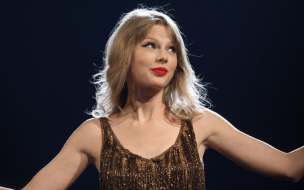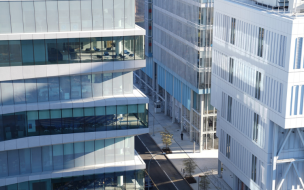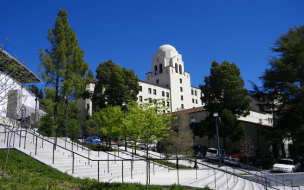With deep roots in the California tech scene, the school is well-known for producing successful alumni in tech and entrepreneurship.
A quarter of the Berkeley Haas MBA class of 2024 went into consulting after graduation, and another 24% went into the tech sector. The mean base annual salary for the class was a massive $159,412. Deloitte, McKinsey & Company, and Boston Consulting Group are among the global names who hired from the class.
No wonder, then, that the MBA program is ranked in the top ten in the country by US News and the top 20 MBA programs globally by the Financial Times.
If you’re considering applying to the Berkeley Haas MBA, you need to understand the kind of students that make up this class.
Here we investigate the Berkeley Haas MBA class profile for the incoming class of 2026, so you can take notes on how to best show off your experience and background in your application. From GMAT scores to acceptance rates to work experience, let’s dig into what you need to know.
Berkeley Haas MBA Class of 2026 | Overview
Berkeley Haas is unusual among many top-ranked US MBA programs for its relatively small cohort. Just 295 students are enrolled in the class of 2026. Although many students have a 'the bigger the better” attitude to MBA programs, smaller programs can allow greater access to professors and deeper connections with your classmates.
Of the 295 students, 42% are women, 19% identify as LGBTQ+, 7% are veterans and 15% are first-generation college students.
The class also comprises students of diverse nationalities and ethnicities. Nearly four in ten (38%) of the class hails from outside the US, representing a total of 35 countries. Of the US students, 51% are minorities, with 29% belonging to minority groups that are underrepresented in higher education.

GMAT scores
The Graduate Management Admission Test (GMAT) is the standardized admissions test that most business schools use to evaluate candidates.
As a result, perhaps one of the most important things to know about a prospective MBA program is the average GMAT scores of its incoming class. This can give you an idea of the score range to aim for and the caliber of students you’ll be rubbing shoulders with if you enroll.
Unsurprisingly, for such a prestigious school, the Berkeley Haas MBA class of 2026 boasts an impressive average GMAT score of 733, which is around 675-685 using the GMAT scoring system for test-takers after February 2024. In short, the average Berkeley Haas student has scored among the top 10% of GMAT test-takers.
However, the range of scores accepted is broad. The middle 80% range of GMAT scores for the class of 2026 is between 615-675, in the latest version of the test.
This means that, although a good GMAT score isn’t the be-all and end-all of your MBA application, a good score will give you a stronger chance of admission.
Undergraduate majors/GPA
One of the benefits of pursuing a top MBA is not just the demographic diversity of the class, but the range of backgrounds represented. This diversity can broaden your perspective and show you new ways to solve business problems.
The Berkeley Haas MBA class of 2026 provides this kind of diversity. Those stepping up from business/commerce majors account for 13% of the class, but there is a strong representation of STEM subjects with 25% of students coming from engineering backgrounds and 18% from economics. More than one in ten (12%) of the class hail from social science majors.
Across their various majors, the Berkeley Haas MBA class of 2026 performed extremely well. The average undergraduate GPA for the class is 3.65, with the middle 80% ranging from 3.38 to 3.9.
Work experience
Many professionals pursue an MBA because they want to change their careers, whether by launching a new business or starting out in a different sector. Studying alongside a broad range of professionals at business school not only helps you understand different approaches to problem-solving but can also give you insight and connections into diverse industries.
Berkeley Haas MBAs have ample experience behind them, coming onto the program after an average of 5.66 years in the workforce. Don’t be deterred if your experience is different, though, the middle 80% range of work experience in the class is from 3.2 to 8.5 years.
As for the industries that Berkeley Haas MBAs come from, almost a quarter are from consulting (23%), followed by high technology and electronics (21%), 17% come from financial services. The most popular named sectors outside of these three are non-profit (7%), health, pharma and biotech (6%), and the military (5%).
Acceptance rates
If you’d like to get an idea of how competitive the MBA application process is at Berkeley Haas, looking at the acceptance rate is a good place to start. Berkeley Haas has one of the most competitive MBA acceptance rates in the US at 23%. Of the 2,904 applicants, 667 were admitted and 244 enrolled.

The MBA at Berkeley Haas is understandably well-known as a stepping-stone into jobs in tech and entrepreneurship in California. With its close proximity to Silicon Valley, the school offers ample opportunity to gain experience in the technology field.
However, if you have other aspirations you should not be put off from applying to Berkeley Haas. The school boasts a diverse range of undergraduate disciplines among its students, as well as a diverse range of outcomes for graduates.
If you decide to apply to the MBA program at Berkeley Haas, you should ensure you invest time and energy into GMAT prep, as the high average test scores show that this is a key area of competition for enrollment.
With that said, as an applicant you should showcase the full range of your abilities and not simply rest on a good GMAT score. The school clearly values diversity not only in the backgrounds of their students but their aspirations, so you'll want to put as much thought into your essays as your test prep.









